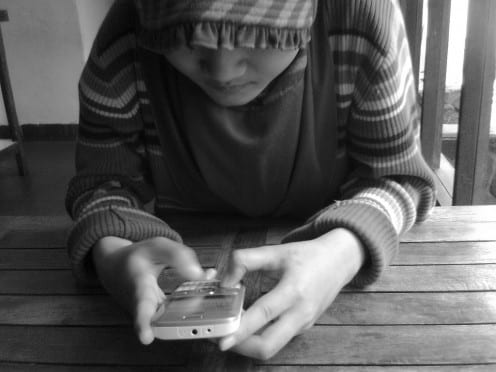Snapshots from the field: using social media in the Italian fieldsite
By Razvan Nicolescu, on 26 November 2013

People walking in the central square of a small town close to the fieldsite during a local feast. Photo by Razvan Nicolescu.
Sandra is a 34 year old lawyer and considers herself to be quite successful. She lives with her parents in a big house near the centre of the town. She is expecting a baby sometime next year. When she found out she was pregnant, she and her fiancée decided to get married and build a ‘real’ family. At the same time, the two renounced using Facebook. This was quite simple as they were using the same Facebook account. The two enjoyed the fact they had no secrets between each other and could share the same friends and tastes. Therefore, they thought it would not make sense to use two separate Facebook profiles. However, when they decided to get married they also decided they would not need Facebook anymore. The main reason for this change was that people ‘gossip a lot’ and they do not need to see that online. They sensed that the intimacy of their couple was enough for them and they really had no intention to share this with people other than their closest friends.
Helena is a 28 year old shop assistant. About one year ago she split with her fiancée. This was a quite difficult moment for her as they were together for more than six years and she was still in love with him. The first thing she did when she realised they had really broken up was quit Facebook. She did not want to see her fiancée anymore and most of his male friends. Helena decided to dedicate her time to work. She also went out with her friends and sisters much more rarely than she used to do before. A few months ago she decided to create a new Facebook account. She thinks the new profile is ‘cleaner,’ mainly because she very carefully selected each person she friended. She actually decreased the number of friends from more than four hundred to just over two hundred. Helena thinks she is totally different on Facebook now than she used to be one year ago. She does not advertise much about herself and does not write too much text. However, she ‘shares’ a lot of content uploaded by other people and ‘likes’ up to 15 times a day. She is always connected on Facebook via her Smartphone and also spends a few hours each evening on this social media at her family’s computer.
Tony is an engineer for civil works. He just finished University and is unemployed. He used to collaborate on several small projects in his branch and accumulated some experience. He is trying to find some stable work although he recognizes this is very difficult. He does some volunteering work for one ecological association in the region. He finds Facebook useful for relating with his friends, but rather useless for the things he is most interested in, like finding a job and building a career. Most of his friends are unemployed too. Just around half of them have Smartphones. When they meet in a café or in the square they rarely check their phones for updates or messages. Tony agrees that Facebook is to be checked out at home, and not when you spend time with your friends.
Andy is an IT engineer. He works from home for a big Italian company and also develops software applications as a hobby. He is a technology enthusiast: he loves new IT gadgets, powerful cars, and pieces of software that he could re-assemble and use in complete new ways. Andy is well connected on several different social media: he consistently follows about a dozen blogs and he is quite active on Facebook, WhatsApp and Instagram. He reads a few journals online and comments whenever he feels he should. He watches movies online, sometimes a few in a row without pause. He does so many things online that his girlfriend rarely sees him. They do not live together and she says it is difficult to get him out of the house after work any time other than when he is walking his dog. Andy seems quite happy and, as he told me, one important reason for this is the freedom he senses when he realizes he could do almost anything he wants from home.
And we, as anthropologists, should put all these together…
 Close
Close






